2021 Oscar Live Action Shorts: Loneliness and Survival Dominate This Year’s Nominees
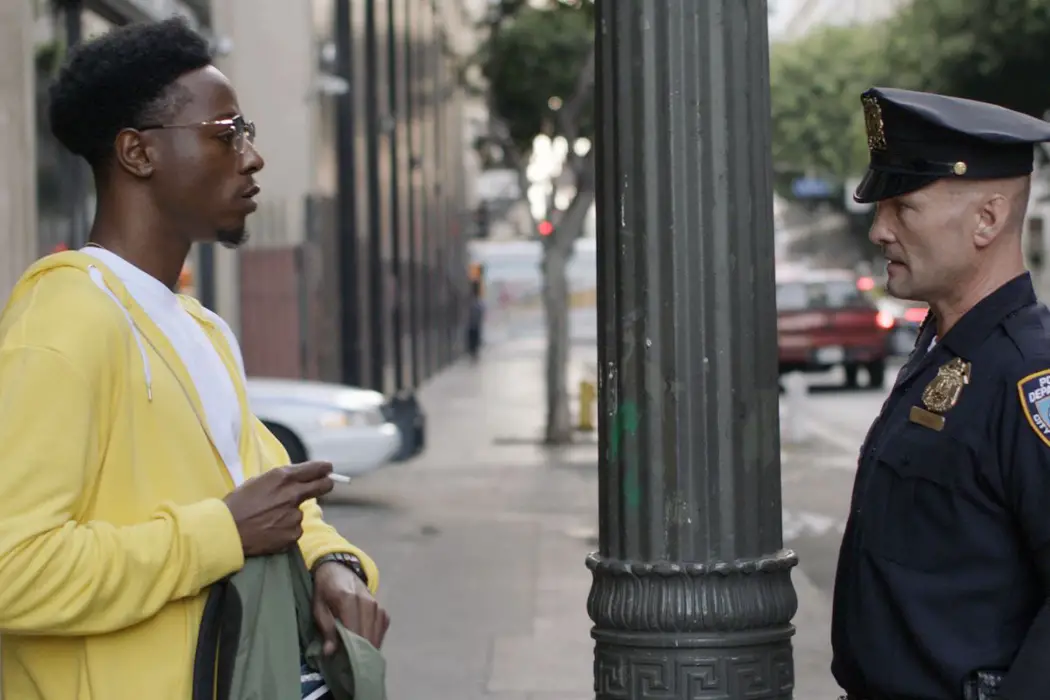
Stephanie Archer is 39 year old film fanatic living in…
We are just days away from the announcement of this year’s 2021 Academy Award winners. I preparation for the evening, I take a look at the five live-action films that made the cut, loneliness, and survival a reoccurring theme through many.
The Present (Farah Nabulsi)

(Palestine)
Too many times, we take the ease at which we do things in our everyday life for granted. Going to the grocery store, shopping for gifts, and taking our children out for a day on the town are common occurrences – many of which are completed with the aid of a car or a bus. The Present, from writer and director Farah Nadulsi, takes a moment to place the ease of life under a microscope, contrasting it to the day-to-day life of Palestinians in Israeli-occupied Palestine.
The Present is poignantly quiet, allowing the story to make an impact rather than interlaced metaphors and visual stylings. It is raw, a story too real and heartbreaking to take in at times. For Yusuf (Sarah Bakri) and Yasmine (Maryam Kang), living in Israeli-occupied Palestine, going to the store can be one of the most difficult errands of the day. For Yusef, going in and out of their local checkpoint is a daily occurrence, but familiarity does not make it any easier or bearable.
The Present is delivered on different levels, giving brief perspectives from a multitude of individuals. The eyes of the citizens of the city, Yusef and Yasmine, and even the guards that manage the border crossing. You see the kindness expressed by the city’s inhabitants, as though there was no border between them. Yet, you are presented with the abuse of power wielded by those at the checkpoint, the superiority alluded to in relation to their status. For Yusef and Yasmine, you see the struggle, the impossible fight for normalcy they strive for – Yusef determined to bring home an anniversary gift to his wife and the bravery and the pressure to grow up fast that Yasmine struggles with.
Deeply moving, The Present is a raw look at the life many of us take so easily for granted.
Feeling Through (Doug Roland)
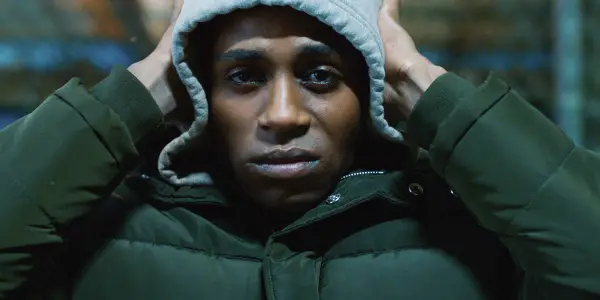
(USA)
The streets within New York City can make you feel a part of the world, an important element within the physical and almost tactile system of an immersive experience. Yet, for some, it is an environment that threatens to swallow you whole. It is loneliness and it is the unknown. For too many teenagers, New York City streets become not only a safe haven of familiarity and connection but also of loneliness, fear, and uncertainty. For Tereek (Steven Prescod), it is a day-to-day struggle to survive, money nonexistent and an apparent vacant home life. And with his options dwindling, and hanging on the whims of those around him, his support system threatens to disappear, and a future begins to take shape. As Tereek watches older homeless men walking the street asking for money, resolved to the life they have found themselves in, he sees what he potentially is destined to become. Yet, a chance meeting not only welcomes viewers into the humble heart of Tereek, but gives him a moment to discover and feel like he matters – and to be seen.
While struggling to find a couch to crash on for the night, Tereek comes across a man blind and deaf man waiting patiently on the kindness of others to help him to the local bus station. There is familiarity between them instantly in the struggles they face daily, the odds stacked against them. While Tereek is able to find a place to crash for the night, he is not able to leave the man, named Artie (Robert Tarango), left waiting for help that may never come.
As he leads him to the bus depot, one act of kindness turns into many, Tereek questioning his morals against survival – even attempting to put himself in Artie’s shoes. As he follows through ensuring that Artie makes his way home, Artie proves that he sees Tereek, encouraging him to stay strong and to keep pushing forward. In a city where literally anyone can disappear, where people are rendered unseen, Tereek is finally seen – and accepted.
Feeling Through, from writer and director Doug Roland, elicits investment from its audience, I myself want to know more about Tereek. Viewers will be drawn to his personality and his small self-sacrifices that constantly speak to him as a person. There was so much in the subtly of Tereek that I wanted to know him more, both the moments that lead him to this point, as well as where this life-altering interaction would lead him. Feeling Through is a short film that not only plays on the catharsis of its audience but asks us to dream bigger for the character on screen – as much as he is enlisted to do the same for himself.
Two Distant Strangers (Travon Free and Martin Desmond Roe)
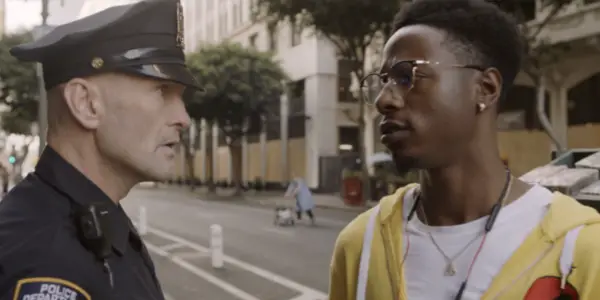
(USA)
Time loop films are far from new, just this year Palm Springs delivering both comedy and new angles, rejuvenating a tiresome storytelling method. Yet, for many time loop films, it is just for that, the action, horror, and the comedy – look at Edge of Tomorrow, Happy Death Day, and Groundhog Day. But not every story is full of comedy or action, some stories are about survival, the need for conversation, and the unwavering dedication to the fight. In the wake of the murder of George Floyd, Two Distant Strangers, from directors Travon Free and Martin Desmond Roe, hits hard, and it should. Unafraid to turn the camera away from the cycle of violence, this short film may not be the most relevant, but also the most poignant of the season.
Waking up from a night out, Carter (Joey Bada$$) makes small talk with Perri (Zaria), the woman he spent the night with, before heading home to care for his beloved dog. As he walks outside, lighting a smoke, he drops an unusually large wade of cash on the sidewalk. Accidentally walking into a white man passing on the street, he attracts the attention of a patrol cop (Andrew Howard) who vehemently begins forcing Carter for information concerning the smoking paraphernalia and the cash. The situation escalates quickly, Carter being thrown to the pavement, a knee in the back of his neck as he cries “I can’t breath”. It is a devastating moment, one encompassing an array of emotions, primarily the heartbreak you feel for Carter as he takes his final breaths. Rippling from Carter, like a life flashing before viewers, you instantly feel the anger towards the cops and the situation, quickly passing to thoughts of the girl he just left behind and the dog now left ownerless at home.
As Carter takes his final breaths, he awakens in Perri’s bed again as if nothing happened. While plagued by a strange sense of deja vu, Carter makes his way outside again, the scenario of police brutality and violence playing out again, this time with alterations. Each time Carter wakes in Perri’s bed unscathed but destined to repeat the unending cycle of violence in a new way. And no matter what he does to alter his situation, the outcome is the same each and every time.
There is heartbreak and devastation in the fact that no matter what he does, nothing changes – no matter how hard he tries, no matter what he does right. He is unable to stop it. Even when those around him intervene, the deli cart vendor recording, the cop giving him a ride home, and even just staying peacefully at Perri’s place, he is left alone in the fight and to push forward.
But in the face of so much death and violence, there is a flicker of hope that resonates from Carter. Even in his most devastating moments, he pushes forward, unrelenting in his fight and attempts to survive – to just make it home to his dog. As he listens to “The Way It Is” by Bruce Hornsby and the Range, the lyrics “That’s just the way it is, Some things will never change, That’s just the way it is, Ah, but don’t you believe them” bookends and encompasses the entirety of the film. While the cycle of violence has been something that has been accepted and taught to generations as “it’s just the way it is”, there can be change. If you continue to push forward, getting up every morning, change will come.
Ayn Levana (White Eye) (Tomer Shushan)
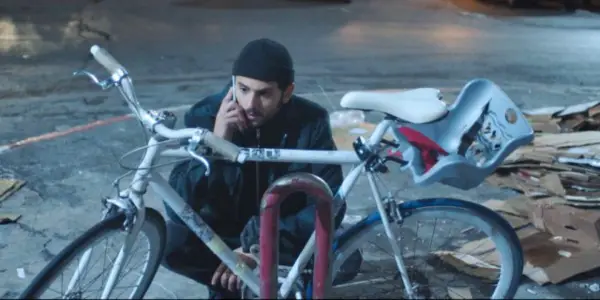
(Israel)
It’s amazing how quickly events can unravel, an accusation causing a ripple effect. And worst of all – you can not call the ripple back. Once it starts, the ripples only get further and wider-reaching. Ayn Levana (White Eye), from writer and director Tomer Shushan, examines the devastating effects of jumping the gun on an accusation and the irreversible effects it can have on the accused.
Ayn Levana begins with Omer (Daniel Gad) finding his stolen bike, his relief, and anger at its discovery culminating in a determination to reclaim it. As he calls the police to have them cut through the chain that stands between him and his bike, he is left alone with the realization that the police can not help. Since he did not file a complaint at the time of the bike’s disappearance, they have no grounds to just take his word for it. Turning down their encouragement to file a complaint, Omer begins to recruit the help of locals around him.
As help becomes harder and harder to acquire, the reunion with his bike slowly slipping from his hands, the current owner of the bike emerges from a local butcher’s facility. His anger and frustration crescendoing, Omer confronts Yunes (Dawit Tekelaeb) – who pleads his innocence with little success. According to him, the bike was sold to him, the purple sticker and white color attracting the eye of his daughter, a purchase that would allow him to provide her a better education.
Omer hears none of it, only seeing a person to blame. He does not engage in the conversation, nor ask any questions. He only points a finger. As he draws the attention of the police, his accusation of theft escalates to potential immigration violations when it is discovered Yunes’ immigration card has expired. As the police take Yunes away, the effects of his arrest settle in on Omer, the daughter left behind, and the weight of his potentially false accusations; guilt he struggles to reconcile.
Through Ayn Levana (White Eye), there is a deep examination into the treatment of immigrants, the blame they shoulder that is not theirs to bear, and the entitlement of those who see themselves right to bestow it. Deeply relevant, this short film puts a harsh light on the boundaries we draw and the possessions we claim, leaving a tainted view of the world around us.
The Letter Room (Elvira Lind)
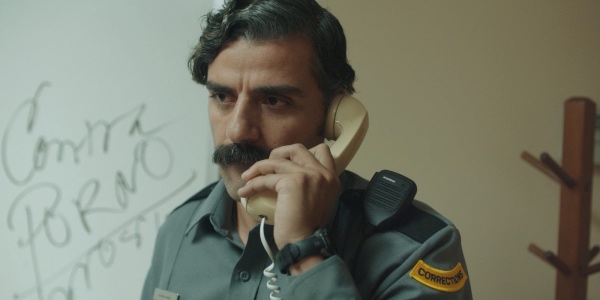
(USA)
Loneliness seems to be a common thread within the live-action nominees this year, Feeling Through tackling it in the depiction of homeless, The Present in the quiet resolve of circumstance, Two Distance Strangers in the fight and here, The Letter Room, from writer and director Elvira Lind, the seclusion of a correctional facility. For The Letter Room, it is an all-encompassing examination of loneliness and its many facets – and most importantly, the things we do to make the world a little less lonely.
Richard (Oscar Isaac), a correctional officer, finds himself reassigned as director to the mailroom. Tasked with supervising the letters both coming and going, Richard finds himself breaking one of the most important rules of his job – never read the letters in their entirety.
Though as he stumbles onto a series of letters from Rosita to one of his death row inmates, his initial intrigue with its deeply sexual content lends itself to a widening of expectations and understanding. When one of the final letters comes in, Rosita seemingly promising to kill herself, Richard is left not only trying to save the young woman but discovering how small acts of kindness go a long way.
The Letter Room is a sweet short that gives a deeply cathartic and humorous experience to its viewers. Because no matter who or where you are, everyone deserves to know they are not alone.
Have you seen the nominated live action shorts? Who do you think will win? Let us know in the comments below!
Does content like this matter to you?
Become a Member and support film journalism. Unlock access to all of Film Inquiry`s great articles. Join a community of like-minded readers who are passionate about cinema - get access to our private members Network, give back to independent filmmakers, and more.













